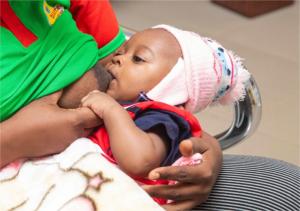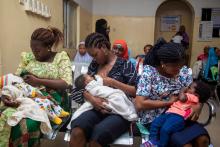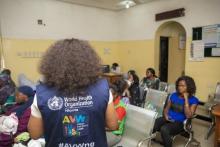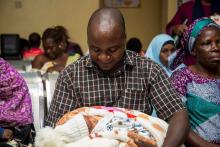World Breastfeeding Week–Parents call for enabling environment for nursing mothers
Abuja, 06 August 2019 – In Abuja, five-month old baby Brian grasps his mother’s breast with his mouth latched on the nipple sucking the succulent and nutritious fortified natural breastmilk. When he’s satisfied, he tilts his head back into his mother’s arms and smiles widely.
“My son only loves breastmilk”, says his mother, Sarah Odigie. “Since the day he was born, he has never agreed to take anything else but breastmilk and I’m so happy because exclusive breastfeeding is the best and I love the bond we have built over the months.”
Similarly, Mr Dennis Shehu , who supported his wife and brought in his two days old child to Primary Healthcare Centre(PHC) for immunization said, “When we had our first and second child, I encouraged my wife to exclusively breastfeed our son and I was so happy with the results. Our children grew much faster than their mates, they were so healthy and strong and I know the exclusive breastfeeding has to do with it. I will always support my wife and buy everything she needs to ensure that she breastfeeds our new born exclusively for the next six months.”
Beyond the inexplicable bond of mother to child, breastfeeding is an essential phase of life and in that respect, Nigeria joins the world to commemorate World Breastfeeding Week (01 to 07 August 2019).
Additionally, 2019 Breastfeeding Week underscores the importance of breastfeeding, particularly in the first six months of life and this year’s theme, “Empower Parents: Enable Breastfeeding”, is not only apt but timely.
Giving a Health Talk to mark the 2019 edition at Area 2 PHC, Abuja, Mrs Clementina Okoro, the Nutrition Focal Person at the Federal Capital Territory (FCT) PHC said, “For this year’s breastfeeding week, empowerment is not only about mothers, it’s about fathers, parents, grandparents and basically everybody in the community has a role to play.”
Mrs Okoro went on to emphasise, “Conveying vital information and knowledge on the importance of exclusive breastfeeding will help to increase support and promote breastfeeding. In this regard, the Federal Government recently launched an initiative ‘Zero water campaign’ for babies under 6 months. So far, the FCT has the second best exclusive breastfeeding rate, but as the nation’s capital, we should come first.” She further said that the FCT PHC Board is also involved in community sensitization and has lined-up several awareness creation activities to highlight the significance of exclusive breastfeeding.
Creating favourable policies for breastfeeding mothers
Every year at least 7million babies are born in Nigeria (Source: UNICEF). This year, World Health Organization (WHO) is working with Government and employers to adopt family-friendly policies to enable breastfeeding and support family to foster nurturing environment where children thrive. Family-friendly policies promote paid maternity leave, access to quality childcare, breastfeeding breaks and dedicated nursing spaces—provide mothers and babies with the time to recover from birth, bond with their babies and breastfeed in the critical early weeks and months of life. These policies are particularly important for working mothers, for whom returning to paid or unpaid work is one of the greatest barriers to breastfeeding.
According to Dr Joy Ufere of WHO Nigeria, “There is need for more action from government at all levels, donors and stakeholders including communities to create an enabling and supportive environment for women everywhere to breastfeed by advancing policies and implementing effective interventions. As WHO we will continue to advocate that family-friendly policies are put in place and ensure these policies are well implemented down to the community level, whereby mothers have enabling environments to breastfeed in public places, at home and even at the workplace.”
She said, “WHO also promotes and advocates for paid maternity leaves up to a minimum of 18 weeks or preferably six months or longer as well as paid paternity leaves. We will also work with Government to ensure that communities receive the appropriate interventions and empowerment to support women to breastfeed as much as they wish.”
National policy recommends exclusive breast-feeding starts within 01 hours after birth until a baby is six months old. Despite the benefits of breast milk, only an estimated 25% of infants in Nigeria are exclusively breast-fed for the first six months of life. Breastmilk is composed of water (88.10%), fat (3.80%) lactose (7%) protein (0.90%) and other key nutrients (0.20%). Giving water to infants before six months puts them at risk of illnesses, such as diarrhoea and malnutrition, in addition, replacing breast milk with any other fluid can adversely impact an infant’s nutritional status, survival, growth and development.
WHO highly recommends all mothers to nurse their babies exclusively for 6 months.
For more information, please contact:
Dr Joy Ufere; Email: uferej [at] who.int; Tel: +2348033392011






